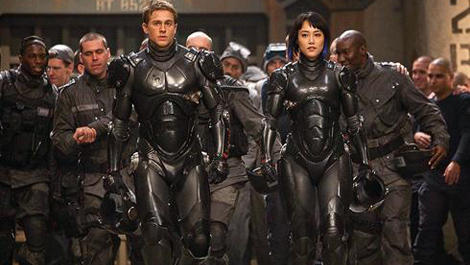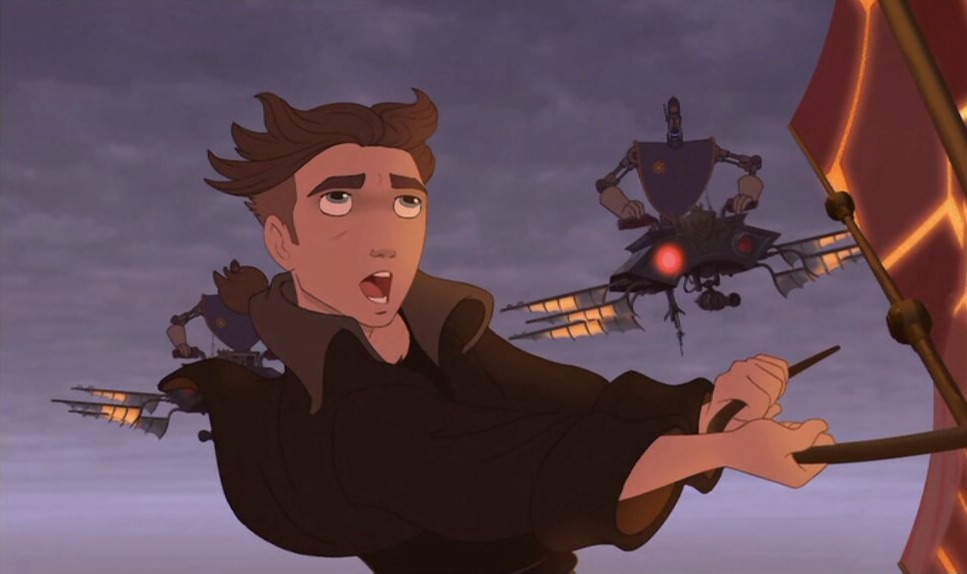It seems there is a standard line about Pacific Rim that is taking hold in a lot of the conversation I’m seeing about the film. The line I keep reading some variation of is that “Pacific Rim is big, dumb, fun.” The film is two of those things, but what I find perplexing is the idea that the movie is dumb. Don’t get me wrong, this isn’t one of the most brilliant pieces of art released in 2013 by any stretch, but it’s a film with more ideas than any other blockbuster I’ve seen this summer, and it isn’t getting the credit it richly deserves. To my mind, Pacific Rim is the best blockbuster of 2013, and it earns the distinction in large part for how dumb it’s not: this is a film of startling imagination that makes up for a lack of intellectual depth with the sheer glut of ideas it has waiting in the wings.
The film is set in a near-future version of our own world that is so well-developed, it is easy to imagine miraculous corners of it the movie just doesn’t have a chance to explore. What we do, see, though, is a reality completely in line with the film’s bleak war for survival, but brimming with the sort of lived-in color director Guillermo Del Toro is known for creating. Everything in this world has a name (and I mean everything, from bases like the Shatterdome, to neighborhoods like the Bone Slums of Hong Kong), to the point where it is almost a joke, yet each of these environs has its own culture that Del Toro lovingly, if briefly, explores. In an early scene, our hero Raleigh (Charlie Hunnam) is working construction on a wall to protect humanity, and in the quick scene set there, we see it as a hellish environ that harkens back to the Great Depression and working conditions of the Industrial Revolution. When Raleigh is taken to the Shatterdome by Stacker Pentecost (Idris Elba), we are introduced to a decommissioned military base brimming with bleak optimism and full of people beaten but not broken in a relentlessly grim march to protect the planet, even after the world’s governments have shut them down. And when Dr. Newton Geiszler (Charlie Day) heads to the Bone Slum to find black market dealer Hannibal Chau (Ron Perlman), he finds a community making do in the fallen carcass of one of the giant beasts (called kaiju) that are terrorizing the planet. Chau’s headquarters rivals the Troll Market sequence in Del Toro’s Hellboy II: The Golden Army for sheer visual verve; it may not be a long scene, but every frame of it is packed with detail and full of eye-candy.
It’s not just the settings of the film that show a greater intelligence at work, though. The film has a fairly straightforward “Monsters vs. Giant Robots” narrative, but its colored around the edges with enough tangents to make it clear Del Toro isn’t asleep at the wheel. The inter-dimensional portal that powers the movie’s narrative is consistently deployed, and there’s enough pseudo-science for Geiszler and his partner Dr. Hermann Gottlieb (Burn Gorman) to bicker over to make it clear all of this is incredibly well thought-through. The concept of drifting (the process through which two pilots meld their minds to control the jaeger, the giant robot) is fascinating, and while the film barely has time to explore it before it rushes on to the next set-piece, it works much better as a part of this world and the narrative Pacific Rim is telling than the sort-of similar “ghosting” from last month’s After Earth.
In fact, that drifting so perfectly represents one of the film’s largest themes is yet further evidence of the thought that goes into this big, bombastic spectacle. Where other summer blockbusters like Star Trek Into Darkness and Man of Steel show us a world in which heroes stand alone against the darkness, compromising their ethics and their positions to defeat threats that are ultimately personal (Zod is a Kryptonian, and the crew of the Enterprise fights to save one of their own as much as to stop their adversary), Pacific Rim is a film about humanity coming together to stop a global threat. Where other films this year are far too often driven by a sense of brooding vengeance, Pacific Rim could not be starker about its forward-looking worldview. Stacker Pentecost tries to prevent Mako Mori (Rinko Kikuchi) from fighting the kaiju because he fears she is too driven by a thirst for revenge after a monster killed her family.
Pacific Rim is by no means a deep film. It has more ideas than it knows what to do with, so it throws them all on the screen without ever taking the time to truly explore some of their narrative possibilities. But to call it a “dumb” summer movie is to ignore how well-thought-out every aspect of its construction is, to deny the sheer sense of creative whimsy that powers its every move. There’s a pulpy nature to much of its naming scheme (if the film didn’t seem in on the joke, things like Shatterdome and Hannibal Chau would be laughable), but it displays a level of creativity I wish more films this summer had evidenced. Even its action sequences, which are on as grand a city-destroying scale as anything else you’ll see this summer, are shot with care and peppered with nifty visual jokes for people whose jaws aren’t dropped by the sight of monsters and robots locked in combat. The intelligence of Pacific Rim doesn’t run deep, but there’s a breadth to its creativity that more than makes up for the brevity with which it treats many of its concepts. It has a “throw it all at the wall and see what sticks” approach that is endearing even if it isn’t always effective. Not everything that happens is even remotely realistic, but then, it isn’t supposed to be. In a summer full of grim sobriety, Pacific Rim is what blockbusters used to be: a nimble clever, crowd-pleaser that doesn’t sacrifice humor for the sake of spectacle and isn’t overly concerned with how well it all strings together. When a movie is as fun and propulsive as Pacific Rim, its easy to overlook the occasional misstep as you’re rocketed onto the next idea. Yet just because the film doesn’t pause to consider every weird, wild little thing Del Toro and co-writer Travis Beacham came up with doesn’t mean we should disregard the ingenuity that serves as the film’s skeleton. You can call Pacific Rim shallow, if you must; just don’t call it dumb.
– Jordan Ferguson








